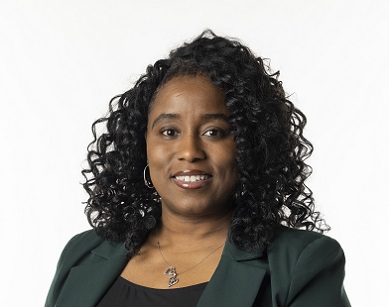Dr. Jacquie Marshall

Dr. Jacquie Marshall: Teaching Nursing Students Requires Selfless Dedication and Vulnerability
Dr. Jacquie Marshall was inspired to choose a profession in nursing by her grandmother, a seamstress, and a part-time nanny in London, England.
“Her community work, which included visitations, service, and remedies for the sick and shut-in, encouraged me to pursue a career in caring for others,” said Dr. Marshall, associate professor and director of assessment, evaluation, and student success at the Christine E. Lynn College of Nursing. “She was also the motivation for my dissertation on Breast Health Attitudes in Afro-Caribbean Women. As a practicing born-again Christian, my grandmother was diagnosed with breast cancer and, after a successful operation, lived another 18 years.”
A nationally certified nurse educator with over 20 years of experience in acute care and academic settings, Dr. Marshall started her journey in nursing education as a clinical nurse specialist within a Level-1 Trauma Center. A two-time Florida Atlantic alumna, she has been part of the College of Nursing faculty for three and a half years.
Dr. Marshall’s primary research interests include breast health in minority women and the intersectionality of spirituality and health, with one of her latest publications focusing on immersive learning and participatory engagement in terms of virtual reality use in online classrooms.
There is a critical intersection where spirituality and health entwine, Dr. Marshall remarked. “At this junction, neither is mutually exclusive of the other, and health care providers should strive to understand the interrelatedness of these concepts and their association with health outcomes,” she said.
Her continued research on spirituality and health significantly bridges the gap between the tangible and intangible, recognizing the beneficial reciprocity of wellness each component may offer. Dr. Marshall hopes to add to the body of nursing knowledge and help find ways to incorporate spirituality and health into each client's care and the college’s core academic curricula.
“Valuable teaching is more than disseminating knowledge and information from teacher to learner,” Dr. Marshall shared. “It requires selfless dedication to the craft through self-discovery, mentorship, discipline, and vulnerability.”
Alongside the constant burden of chronic diseases, nurses face the persistent need for health care reform, Dr. Marshall noted, adding that her experience and education in acute and community health motivate her work to ensure students are aware of social reform issues that affect population health outcomes.
“In teaching, I remind them that amidst varying causal factors to wellness, such as the social determinants of health and culture, there is an escalating association between educational level and coordination of health care resources, contributing to the mounting encumbered incidence and cost of chronic diseases,” she said.
In her role as a teacher, Dr. Marshall accepts the charge to awaken students to their social responsibility, introduce them to the principles of nursing as caring, and help them understand that the acquisition of higher knowledge and sound clinical skills carries the accountability and honor to serve one’s community as a nurse educator and change agent. She is also working on a potential international service-learning partnership for College of Nursing students. As a professor, she often encourages them to author presentations, publish their work, and participate in professional conferences.
“One of my favorite quotes is by Dan Pratt and John Collins: ‘Effective teaching seeks to change society in substantive ways. From this point of view, the object of teaching is the collective rather than the individual. Good teachers awaken students to the values and ideologies embedded in texts and common practices within their discipline.’”
